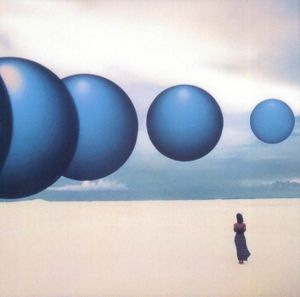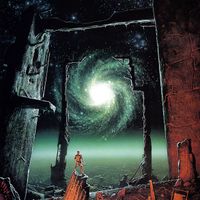HUMN 1011/Fall 2020/Lessons/2: Difference between revisions
(Added quiz. More to do.) |
(Added Area B.) |
||
| (5 intermediate revisions by the same user not shown) | |||
| Line 2: | Line 2: | ||
{{:HUMN 1011/Fall 2020/Lesson-tabs-top}} | {{:HUMN 1011/Fall 2020/Lesson-tabs-top}} | ||
{{Large|August 19 – September 1: What Is Science Fiction?}}<br /> | {{Large|August 19 – September 1: What Is Science Fiction?}}<br /> | ||
{{Big| | {{Big|First off: let’s try to define our term: science fiction—it may not be what you think.}} | ||
[[File:Leguin-sf.jpg|thumb]] | [[File:Leguin-sf.jpg|thumb]] | ||
In his essay on sf,<ref>A simple “sf” will be our only acceptable abbreviation for the subject matter this semester—not sci-fi or SyFy (whatever that is).</ref> J. G. Ballard writes: | In his essay on sf,<ref>A simple “sf” will be our only acceptable abbreviation for the subject matter this semester—not sci-fi or SyFy (whatever that is).</ref> J. G. Ballard writes: | ||
{{Cquote|I firmly believe that only science fiction is full equipped to become the literature of tomorrow, and that it is the only medium with an adequate vocabulary of ideas and situations.<ref>{{cite book |last=Ballard |first=J. G. |chapter=Which Way to Inner Space |orig-year=1962 |date= |title=A User's Guide to the Millennium |url= |location=New York |publisher=Picador USA |page=198 |isbn= |author-link= |ref=harv }}</ref> }} | {{Cquote|I firmly believe that only science fiction is full equipped to become the literature of tomorrow, and that it is the only medium with an adequate vocabulary of ideas and situations.<ref>{{cite book |last=Ballard |first=J. G. |chapter=Which Way to Inner Space |orig-year=1962 |date=1996 |title=A User's Guide to the Millennium |url=https://archive.org/details/usersguidetomill0000ball |location=New York |publisher=Picador USA |page=198 |isbn= |author-link= |ref=harv }}</ref> }} | ||
It seems, at least in part, that Ballard, writing on 1962, upholds science fiction as the only literature able to help humanity travel into the space age. Likewise, Isaac Asimov seems to support this idea: | It seems, at least in part, that Ballard, writing on 1962, upholds science fiction as the only literature able to help humanity travel into the space age. Likewise, Isaac Asimov seems to support this idea: | ||
| Line 20: | Line 20: | ||
! Due !! Read/View !! Do !! Write !! Test | ! Due !! Read/View !! Do !! Write !! Test | ||
|- | |- | ||
| style="text-align:center;" | 08/25 || {{Bulleted list |[[Some Views of Science Fiction]] |Le Guin “Intro to the ''Norton Book of SF'',” pp. 15–32 ([https://discourse.grlucas.net/t/humn-1011-texts-on-defining-science-fiction/237 PDF]) |Ballard “Which Way to Innerspace” ([https://discourse.grlucas.net/t/humn-1011-texts-on-defining-science-fiction/237 PDF])<ref>Be sure you read Ballard and Le Guin carefully and take notes before attempting the quiz. This is a challenging one. I posted some reading notes of Le Guin for your assistance, though they will not substitute for reading the essay.</ref> }} || style="text-align:center;" | {{Clickable button 2|Quiz|url=https://forms.gle/QNuZ8Mcap4kvqkFx8|class=mw-ui-progressive}} || style="text-align:center;" | {{Clickable button 2|Respond|url=https://discourse.grlucas.net/t/what-is-science-fiction/238 |class=mw-ui-progressive}} || {{CNone|-}} | | style="text-align:center;" | 08/25 || {{Bulleted list |[[Some Views of Science Fiction]] |Le Guin “Intro to the ''Norton Book of SF'',” pp. 15–32 ([https://discourse.grlucas.net/t/humn-1011-texts-on-defining-science-fiction/237 PDF])<ref>Any texts marked {{PDF}} will be available on the forum. You must have an account to access them</ref> |Ballard “Which Way to Innerspace” ([https://discourse.grlucas.net/t/humn-1011-texts-on-defining-science-fiction/237 PDF])<ref>Be sure you read Ballard and Le Guin carefully and take notes before attempting the quiz. This is a challenging one. I posted [[July 20, 2020|some reading notes of Le Guin]] for your assistance, though they will not substitute for reading the essay. They will, however, provide a bit of guidance in what to pay attention to.</ref> }} || style="text-align:center;" | {{Clickable button 2|Quiz|url=https://forms.gle/QNuZ8Mcap4kvqkFx8|class=mw-ui-progressive}} || style="text-align:center;" | {{Clickable button 2|Respond|url=https://discourse.grlucas.net/t/what-is-science-fiction/238 |class=mw-ui-progressive}} || {{CNone|-}} | ||
|- | |- | ||
| style="text-align:center;" | 09/01 || {{Bulleted list |''[https://bit.ly/3hg62Zk Brave New Worlds: The Science Fiction Phenomenon]'' (Films on Demand) |“[https://youtu.be/crkt1kiNj4E The Value of Science Fiction]” (YouTube) }} | | | style="text-align:center;" | 09/01 || {{Bulleted list |''[https://bit.ly/3hg62Zk Brave New Worlds: The Science Fiction Phenomenon]'' (Films on Demand)<ref>This link should take your to the database in the USG system. It is protected, so you will have to login with your MGA credentials, if you are not already.</ref> |“[https://youtu.be/crkt1kiNj4E The Value of Science Fiction]” (YouTube)|Research science fiction and find a new article or video (you will need this for the forum)<ref>Wikipedia has some excellent sources; you might begin with [[w:Science fiction|science fiction]].</ref> }} || {{CNone|-}} || style="text-align:center;" | {{Clickable button 2|Respond|url=https://discourse.grlucas.net/t/what-is-science-fiction-part-2/251 |class=mw-ui-progressive}} || style="text-align:center;" | {{Clickable button 2|Test|url=https://forms.gle/gxWvMjjEjik5F8rs9|class=mw-ui-destructive}} | ||
|} | |} | ||
{{Area B}} CTOC Unit One: Elements of Critical Thinking; CTOC Unit Two: Evaluating Arguments | |||
{{ | |||
{{1011-help}} | {{1011-help}} | ||
{{Notes}} | |||
{{:HUMN 1011/Fall 2020/Lesson-tabs-bottom}} | {{:HUMN 1011/Fall 2020/Lesson-tabs-bottom}} | ||
Latest revision as of 13:32, 29 July 2020
Before beginning your work each week, read through the whole lesson so you know what to expect and understand what’s expected. Each tab corresponds to a lesson. All assignments are contained therein. Any questions should be posted to the class forum, and be sure to read my weekly feedback.
| L1 | L2 | L3 | L4 | L5 | L6 | L7 | L8 |
August 19 – September 1: What Is Science Fiction?
First off: let’s try to define our term: science fiction—it may not be what you think.
In his essay on sf,[1] J. G. Ballard writes:
| “ | I firmly believe that only science fiction is full equipped to become the literature of tomorrow, and that it is the only medium with an adequate vocabulary of ideas and situations.[2] | ” |
It seems, at least in part, that Ballard, writing on 1962, upholds science fiction as the only literature able to help humanity travel into the space age. Likewise, Isaac Asimov seems to support this idea:
| “ | Science fiction is that branch of literature which is concerned with the impact of scientific advance upon human beings. | ” |
| — Isaac Asimov, Modern Science Fiction, edited by Reginald Bretnor (1953) | ||
Like all artistic expressions, sf says something about those who create and popularize: i.e., us. What can we learn about ourselves by looking at science fiction? Hopefully we’ll get an idea or two in this lesson.
Lesson Instructions and Explanation
|
|---|
|
Generally to avoid confusion, I have tried to make all lessons work the same way. Each lesson will have its weekly section presented in a chart. Work your way from left to right. Open links in tabs, so you don’t lose track of this page. DueThis is the date this sections’s work is due. Complete everything in the row before 11:59:59 pm on this date. ReadThese are the readings for this section. Read them carefully, taking notes as you do. I recommend reading from a book or on paper, as you can highlight an annotate as you progress. This will help you in the next sections. DoThis section will usually be a reading quiz on what you just read, so be sure to take it while the reading is fresh in your mind. However, it may also include other assignments or activities that must be accomplished. WriteMost writing will be on the class forum. This section will contain instructions and guidance for completing your writing. Often, this will link to a series of discussion prompts for the text you’re reading. Choose one prompt, or thread, to answer, or create your own post (especially if there are none there you can or want to respond to) by clicking + New Topic. I’m looking for your engagement here, so aim for a single longish post and a shorter response to someone else’s post. Using secondary sources correctly for support will always earn you more points. Be sure you’re following the conventions outlined in and the guidelines in . TestThe test will be the last activity. It will test your knowledge of the entire lesson’s materials. Take this only after you have accomplished everything else in the lesson. The idea here is that you show me what you learned about the all of the lesson’s material. Please write in complete sentences and give enough detail to answer the questions. Your answers should convince me that you have learned and thought about the materials. |
| Due | Read/View | Do | Write | Test |
|---|---|---|---|---|
| 08/25 |
|
- | ||
| 09/01 |
|
- |
Area B Requirement[7]: CTOC Unit One: Elements of Critical Thinking; CTOC Unit Two: Evaluating Arguments
Tip: Remember, you can always get assistance with anything on the class forum. If you need assistance with something more general, try the help forum. For course content assistance and citations for assigned texts, see the study guide. 🚀 |
notes
- ↑ A simple “sf” will be our only acceptable abbreviation for the subject matter this semester—not sci-fi or SyFy (whatever that is).
- ↑ Ballard, J. G. (1996) [1962]. "Which Way to Inner Space". A User's Guide to the Millennium. New York: Picador USA. p. 198.
- ↑ Any texts marked (PDF
 ) will be available on the forum. You must have an account to access them
) will be available on the forum. You must have an account to access them
- ↑ Be sure you read Ballard and Le Guin carefully and take notes before attempting the quiz. This is a challenging one. I posted some reading notes of Le Guin for your assistance, though they will not substitute for reading the essay. They will, however, provide a bit of guidance in what to pay attention to.
- ↑ This link should take your to the database in the USG system. It is protected, so you will have to login with your MGA credentials, if you are not already.
- ↑ Wikipedia has some excellent sources; you might begin with science fiction.
- ↑ As it states on your requirements, all of these units are on D2L. You may do these any time you wish, but they all be completed by the end of the semester, about 10 units. I suggest keeping up with them as assigned in each lesson.
| 🕒 07-29-2020 | 📆 Make an Appointment | 💬 Ask a Question | 📣 Leave Feedback |

